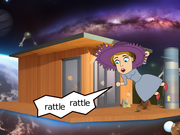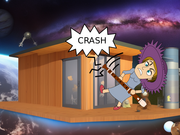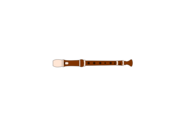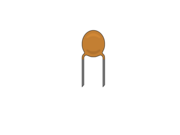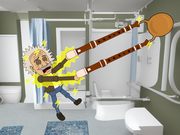一哭二鬧三上吊
Characters and words in 一哭二鬧三上吊
one / single / a (article) / as soon as / entire; whole; all; throughout / "one" radical in Chinese characters (Kangxi radical 1) / also pr. [yao1] for greater clarity when spelling out numbers digit by digit
two / 2 / (Beijing dialect) stupid
noisy / cacophonous / to make noise / to disturb / to vent (feelings) / to fall ill / to have an attack (of sickness) / to go in (for some activity) / to joke
three / 3
三
=
一
+
二
:
Mnemonic symbol: Cartesian coordinate system with three (三) axes. Socrates (s-) is performing in front of the anthill (-an1). He created an electrical flute by attaching a large capacitor (二) to the flute (一), so that he can get the attention of all the people. Moreover, he's balancing on a Cartesian coordinate system (三). Unfortunately, only three (三) people stop to watch the performance.
(bound form) up; upper; above; previous / first (of multiple parts) / to climb; to get onto; to go up / to attend (class or university) / (directional complement) up / (noun suffix) on; above
上
=
丨
+
二
:
Sherlock Holmes (sh) investigates a mysterious murder in the anglepod's bathroom (ang4). Somebody has been killed while using the golden squat toilet. He finds a mysterious apparatus on top (上) of it, and breaks it open using a dinosaur bone (丨). As the apparatus breaks, he finds the murderer's weapon: The dinosaur bone is sticking in a capacitor (二), which has been hooked up to the golden squat toilet to kill the victim using the lethal electric charge.
上
=
一
+
丄
:
Mnemonic symbol: as in the movie "Up", someone will be using lots of balloons to send something on a long journey. Sherlock Holmes (sh) prepares to take off in the anglepod's bathroom (ang4). He fixed a lot of balloons (上) to a flute (一), on which he plans to sit during his journey. At this moment the flute is only held back by the 90 degree corner clamp (丄) which is fixing it to the ground.
to suspend / to hang up / to hang a person
Words with 一哭二鬧三上吊
一哭二鬧三上吊
is not used as a component in another word.
Sentences with 一哭二鬧三上吊
一哭二鬧三上吊 currently does not appear in any sentence.
